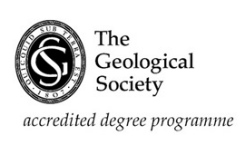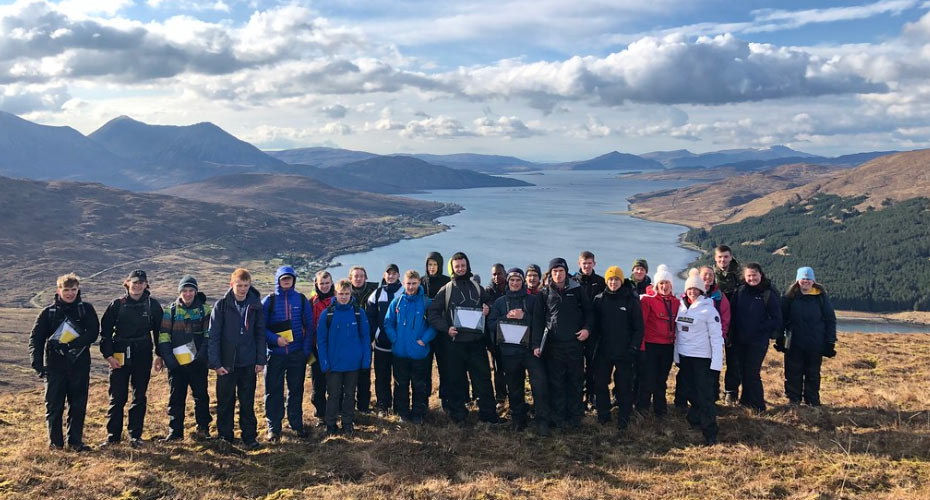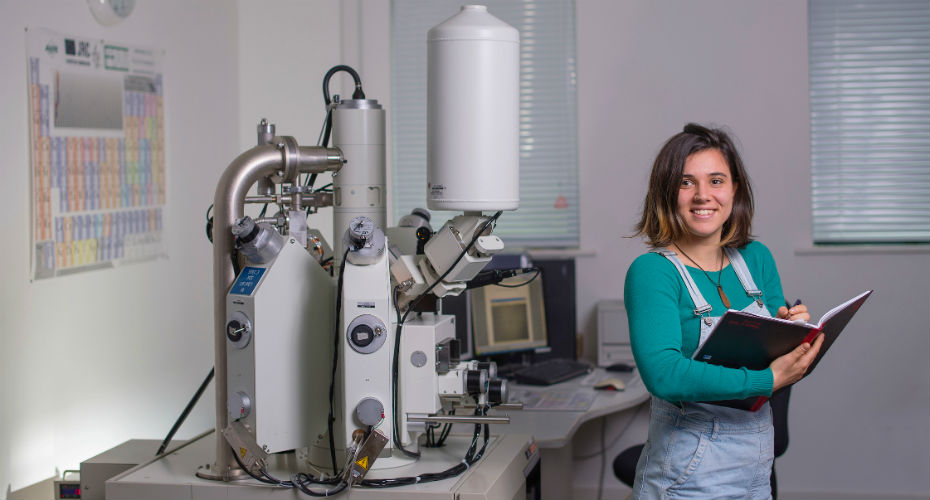| UCAS code | F756 |
|---|---|
| Duration | 3 years |
| Entry year | 2024 |
| Campus | Penryn Campus |
| Discipline | Geology |
| Contact | Web: Enquire online |
| Typical offer | |
|---|---|
|
A-Level: BBC |
Overview
- Designed to equip you with an advanced understanding of the geology, chemistry and physics of the Earth and to tackle global environmental challenges
- Gain technical experience through more than 60 days of fieldwork, as well as laboratory classes, optional industry placement and independent research opportunities
- Study in Cornwall at Exeter’s Penryn Campus and gain access to world-class geoscience case studies on your doorstep
- Taught by the Camborne School of Mines, a combined geoscience and mining department with an international reputation for research-inspired teaching
- Excellent industrial links ensure that the skills gained will be highly valued by employers. Recent partners include: Rio Tinto, British Geological Survey, European Space Agency and CL:AIRE.
![]()
Top 5 in the UK for Geology
5th in The Times and The Sunday Times Good University Guide 2024
![]()
Top 5 in the UK for Earth and Marine Sciences
4th in The Guardian University Guide 2024
![]()
Top 100 in the world for Geology and Geophysics
QS World University Subject Rankings 2023
Accreditations

Our programmes are accredited by The Geological Society which is the first step on the ladder to Chartered Geologist status after graduation.
Entry requirements (typical offer)
| Qualification | Typical offer | Required subjects |
|---|---|---|
| A-Level | ABB |
GCE AL in two science subjects at grade B or AL Geology at grade B. GCE AL science includes: Biology/Human Biology*; Chemistry; Computing; Design and Technology; Economics; Electronics; Environmental Science; Environmental Studies; Geography; Geology; Maths/Pure Maths/Further Maths*; Physical Education; Physics; Psychology; Science (applied); Statistics. *If more than one of these is taken they would only count as one 'science' but could count as two A-levels towards our general requirements. |
| IB | 32/655 | Two sciences at HL5 or Geology at HL5 |
| BTEC | DDM | BTEC Extended Diploma (2016) - Applicants studying one of the following new BTEC Extended Diplomas will be considered without GCE AL requirements: Applied Science, Engineering. |
| GCSE | C or 4 | English Language and Mathematics |
| Access to HE | 24 L3 Credits at Distinction Grade and 21 L3 credits at Merit Grade. | either 12 L3 Credits at Merit Grade in Geology OR 24 L3 Credits at Merit Grade in two acceptable Science subject areas. |
| T-Level | Distinction | T-level Design, surveying and planning for construction only |
| Contextual Offer | A-Level: BBC |
Specific subject requirements must still be achieved where stated above. Find out more about contextual offers. |
| Other accepted qualifications | ||
| English language requirements |
International students need to show they have the required level of English language to study this course. The required test scores for this course fall under Profile B2. Please visit our English language requirements page to view the required test scores and equivalencies from your country. |
|
NB General Studies is not included in any offer.
Grades advertised on each programme webpage are the typical level at which our offers are made and provide information on any specific subjects an applicant will need to have studied in order to be considered for a place on the programme. However, if we receive a large number of applications for the programme we may not be able to make an offer to all those who are predicted to achieve/have achieved grades which are in line with our typical offer. For more information on how applications are assessed and when decisions are released, please see: After you apply
Course content
The modules we outline here provide examples of what you can expect to learn on this degree course based on recent academic teaching. The precise modules available to you in future years may vary depending on staff availability and research interests, new topics of study, timetabling and student demand.
During your first year, which is shared with all Geology students, you will gain a solid foundation in geology and the geosciences. You will undertake nine one-day field classes to iconic locations across Cornwall during terms 1 and 2, and attend a one-week residential field class in Pembrokeshire during early May.
No information has been returned for this stage. Please check back again later.In Year 2 you will build a detailed understanding of the science underpinning the foremost global geo-environmental challenges currently facing humankind. You will also further develop core geoscience and transferable skills ready for a graduate-level career in environmental geoscience. Your training will prepare you for an Independent Research Project (IRP) between Years 2 and 3, where you will carry out a field-based geo-environmental research project or industrial placement.
No information has been returned for this stage. Please check back again later.In Year 3, you will write up your Independent Research Project. Core and optional modules will deepen your knowledge on the interactions between the geology, chemistry, physics, and biology of the Earth’s environment, and how these can in turn be influenced by human activities. A ten-day residential fieldcourse is the highlight of the year, where you will explore an outstanding area of geoscience in Spain, Tenerife or Cyprus.
No information has been returned for this stage. Please check back again later.Fees
Tuition fees for 2024 entry
UK students: £9,250 per year
International students: £29,700 per year
Scholarships
The University of Exeter has many different scholarships available to support your education, including £5 million in scholarships for international students, such as our Global Excellence Scholarships*. Financial support is also available for students from disadvantaged backgrounds, lower income households and other under-represented groups to help them access, succeed and progress through higher education.
* Terms and conditions apply. See online for details.
Fieldwork

All our Geology degree programmes provide a wealth of practical experience of working in the field at amazing locations across the UK and abroad.
The first year includes a six-day residential field course in Pembrokeshire along with nine one-day field-classes in Cornwall. The second year includes 34 days of fieldwork, in locations that include Cornwall, Devon, Dorset and the Isle of Skye in Scotland. The third year includes a geological field course in Cyprus or southern Spain.
Fieldwork is assessed through field notebooks, technical reports, and practical field-based assignments.
For more information see our .
Learning and teaching
Learning on campus
Learning and teaching are delivered through a combination of lectures, ‘hands on’ practical classes, seminars, tutorials, field-based teaching, and independent study. Laboratory practical classes will develop your understanding of a range of geoscience topics and help put theory into practice.
On average you will have 18 teaching hours per week and will need to undertake additional independent study (e.g., directed reading, assignments, and project work). You can expect your total workload to average about 40 hours per week during term time.
Our geoscience degrees are also flexible; you can transfer between any of our BSc and MSci geology and geoscience degrees during your first year.
Research-led culture
You will benefit from being taught by experts active in internationally-relevant research. In doing so, you will discuss the very latest ideas, research discoveries and new technologies in seminars and in the field, and you will become actively involved in a research project yourself. All our academic staff are active in internationally-recognised scientific research across a wide range of topics. You will also be taught by leading industry practitioners.
Assessment
Assessment methods vary between modules and may include individual or group reports, presentations, practical write-ups and exams. More innovative assessment techniques are also used, and may include the use of websites, posters, social media, videos, science communication, and dragons-den style presentations. You must pass the first year in order to progress to the second year, but your first-year marks do not count towards your final degree classification.
Support
- Personal Tutor: You will have a Personal Tutor available for advice and support throughout your studies.
- Study skills: Help with essay writing, research skills, time management, presentations and more.
- Modern language courses
- Health, wellbeing and general support
Optional modules outside of this course
Each year, if you have optional modules available, you can take up to 30 credits in a subject outside of your course. This can increase your employability and widen your intellectual horizons.
Proficiency in a second subject
If you complete 60 credits of modules in one of the subjects below, you may have the words 'with proficiency in [e.g. Social Data Science]' added to your degree title when you graduate.
- A Foreign Language
- Data Science
- Entrepreneurship
- Innovation
- Law
- Leadership
- Social Data Science
Your future

Geologists are required to help the global community deal with a range of environmental problems related to climate, energy, water, air pollution, natural hazards, supply of raw materials, and more.
Geology and geoscience degrees not only prepare you to tackle the world’s biggest environmental challenges, but they also lead to high employment rates and decent salaries, with graduate opportunities in the UK and around the world. The Camborne School of Mines Association and the award-winning University of Exeter Careers Service have the skills and a strong network of alumni to help you find employment.
Employer Visits
We provide regular ‘Pint and Pasty’ employer events throughout term that allow our students to network and meet with potential employers, and learn more about possible career paths.
Career Paths
Our graduates enjoy excellent career opportunities in a range of subjects, including mineral exploration, hydrogeology, geophysics, geotechnics, and environment-related industries. Graduates also go on to roles outside of geology, utilising the array of transferable skills they have developed. Recent graduates work in fields as diverse as the UK civil service, Arup Geotechnics, the National Trust, the Ministry of Defence and Geomarine Ltd.
The broad-based skills acquired during your degree will give you an excellent grounding for a wide variety of careers, not only those related to Geology but also in wider fields. Examples of roles recent graduates are now working as include:
- Chartered Surveyor
- Engineering Project Manager
- Project Engineer
- Engineering Professional
- Estimator, Valuer or Assessor
- Environment Professional
- Financial Accounts
- IT Operations Technician
- Laboratory Technician
- Physical Scientist
Employer-valued skills this course develops
Career opportunities for geologists are limitless. Our programmes provide the essential skills for employment in a modern workplace, including discipline specific skills like Geographical Information Systems (GIS), geological mapping and fieldwork, mineral deposit identification and exploration, scientific programming, and use of technical software, in addition to transferable skills such as problem solving, communication, teamwork, leadership, and quantitative data analysis.
Geologists from the University of Exeter are recognised as being articulate, resourceful and diligent, and claim great job satisfaction and excellent salaries.











